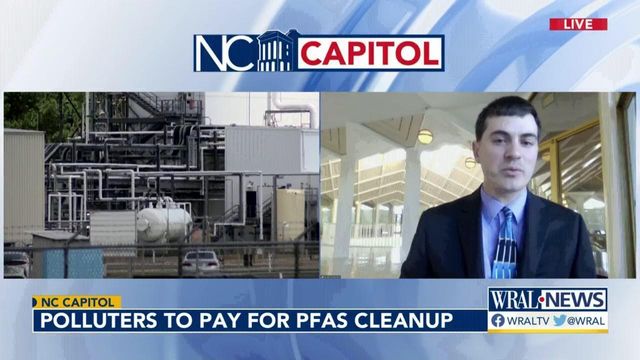NC lawmakers mull proposal to crack down on PFAS contamination
North Carolina lawmakers on Thursday considered a plan that would require companies responsible for polluting public water systems with certain long-lasting chemicals to be on the hook for costs associated with treatment.
The proposal, introduced by state Rep. Ted Davis, a New Hanover County Republican, would allow the state Department of Environmental Quality to set safe drinking water standards for per- and polyfluoroalkyl chemicals and force manufacturers to pay for upgrades and cleanup. It has strong bipartisan support from more than 30 lawmakers.
The move comes as a response to revelations in 2017 that the Chemours Co. contaminated the Cape Fear River with the PFAS compound GenX. Ratepayers in Brunswick and New Hanover have since seen or will soon see increased water bills to address the pollution.
“We must protect our drinking water,” Davis said during the hearing. “We must hold polluters accountable, and we must make sure that our residents are not bearing the burden of that water treatment cost when it's caused by a known responsible party.”
In 2019, Wilmington, Del.-based Chemours agreed to a consent order that resulted in a $12 million fine to address harm to private drinking water wells along the coast. The order didn’t address contamination that headed down the Cape Fear River into public drinking water systems.
A state investigation also prompted the chemicals manufacturer to agree to spend more than $100 million to reduce air and water emissions of all PFAS compounds by the end of 2019.
Jeff Fritz, a government affairs executive for Chemours, addressed lawmakers during the hearing. He said GenX had largely been an unregulated compound at the time, called the bill unnecessary and said it unfairly targets Chemours.
“Chemours has done an unprecedented amount of work both before and under the consent order,” Fritz said. “We meet regularly with DEQ to speed our actions along, and, today, we’ve spent or committed to spend more than $400 million on all these actions. It’s not the cheap way.”
If House Bill 1095 were signed into law, it would take effect retroactively to the start of 2017, which is when the company’s GenX issues were widely known.
Chemours and a collection of industrial groups oppose the measure. They say the bill could result in job loss and have a chilling effect on the business community. State Rep. Pricey Harrison, a Guilford County Democrat, said she was appalled by the criticism expressed.
"I can't believe this bill isn't sailing through,” she said.
The NC Chamber, a leading business advocacy group in the state, said it opposed the bill, as did the American Chemistry Council, the North Carolina Forestry Association and the North Carolina Manufacturers Alliance.
Rep. Abe Jones, D-Wake, said inaction is not an option.
“What do they propose that we do?” he said of the bill’s opponents. “If they're against this, fine. What do you think should be done? There's got to be some solution other than what's going on.”
Local officials and environmental activists see the effort by lawmakers as long overdue.
Ken Waldroup, executive director at the Cape Fear Public Utility Authority, said 200,000 customers will see an average 8.5% rate increase starting July 1. The 13,000 water-only customers will experience a heftier 18% hike. The bill increases are worse elsewhere.
John Nichols, Brunswick County’s public utilities director, said his department serves 350,000 and had to increase rates by 40% recently. “It’s all because of industrial pollution upstream,” he said.
Emily Donovan, a Brunswick County resident and co-founder of Clean Cape Fear, likened the current drinking water to “poison.” She spoke through tears in the hearing, saying, "I raised my children on the water.”
After the hearing, Fritz, the Chemours executive, declined to answer questions, saying he’d let his testimony speak for itself. “I thought the committee was very fair in hearing our conversation,” he said.
The company didn’t immediately provide additional comment.
DEQ Secretary Elizabeth Biser said in an interview that she couldn’t predict whether the legislation she has pushed for will be enacted before lawmakers conclude this year’s legislative session over the next month. Davis said in an interview after the hearing that he hopes to bring the bill to a committee vote if chamber leaders are supportive of the effort.
Thursday’s House Judiciary 1 Committee hearing was for discussion only, meaning no votes were taken.
House Speaker Tim Moore told reporters Thursday afternoon that he doesn’t anticipate the PFAS bill to clear the chamber this year.
“More than likely that’s a long session priority, but I can tell you for the representatives down in that region of the state it’s a critical issue,” Moore said.
If a vote happens and the bill is approved in the judiciary committee, it would advance to the chamber’s rules committee before going to a floor vote in the House. Davis said he knows of a couple Republicans supportive of the effort who would assist him in getting the measure across the finish line in the Senate.
The bill would then head to Democratic Gov. Roy Cooper. His office noted Cooper's support for the bill.
"People deserve to have confidence in the water they drink and they shouldn't have to bear the costs of cleaning up corporate pollution," Cooper wrote on Twitter last week. "Our proposed bipartisan legislation gives us another tool to make sure polluters are held accountable and our water is safe."
Davis said the measure would send a powerful message.
"I guarantee you if this bill passes, it will be a deterrent for anybody who has a business in North Carolina that might even think about doing something that would manufacture a PFAS compound to be introduced into our environment,” Davis said.











